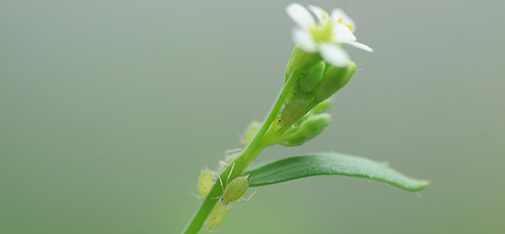DynaMo partner Daniel Kliebenstein publishes in Science

From the selection experiment: Several green peach aphids (Myzus persicae) feeding on thale cress. Photograph: Tobias Züst
DynaMo partner Professor Daniel Kliebenstein, together with an international research team, has just published a report in Science.
Title:
Natural enemies drive geographic variation in plant defenses
Authors:
Tobias Züst, Christian Heichinger, Ueli Grossniklaus, Richard Harrington, Daniel J. Kliebenstein, Lindsay A. Turnbull.
Published:
5 October 2012
Abstract:
Plants defend themselves against attack by natural enemies, and these defenses vary widely across populations. However, whether communities of natural enemies are a sufficiently potent force to maintain polymorphisms in defensive traits is largely unknown. Here, we exploit the genetic resources of Arabidopsis thaliana, coupled with 39 years of field data on aphid abundance, to (i) demonstrate that geographic patterns in a polymorphic defense locus (GS-ELONG) are strongly correlated with changes in the relative abundance of two specialist aphids; and (ii) demonstrate differential selection by the two aphids on GS-ELONG, using a multigeneration selection experiment. We thereby show a causal link between variation in abundance of the two specialist aphids and the geographic pattern at GS-ELONG, which highlights the potency of natural enemies as selective forces.
Daniel Kliebenstein is one of the four partners of DynaMo Center of Excellence, and his research focuses on quantitative genetics and systems biology. His studies include large-scale analysis of transcriptomic and metabolomic datasets to understand transcriptional regulatory network interactions. For the report in Science Daniel Kliebenstein helped choosing the spectrum of plant genotypes and associated biochemical to use in generating the population for selection. He also contributed with technical knowledge of how to measure chemicals and biological knowledge about how to interpret the resulting chemical/genotypic shifts due to selection.
